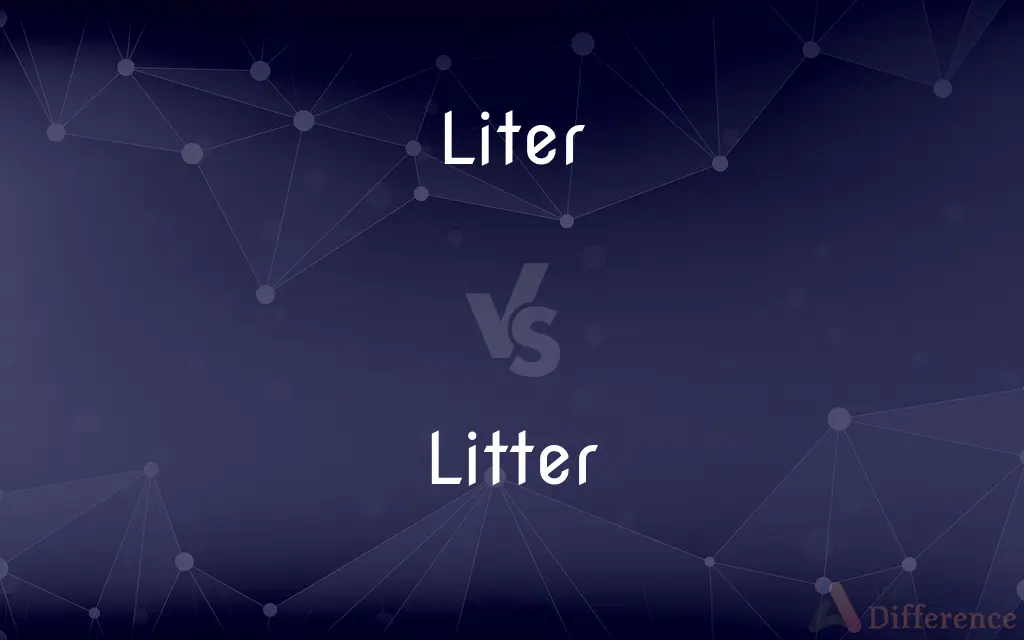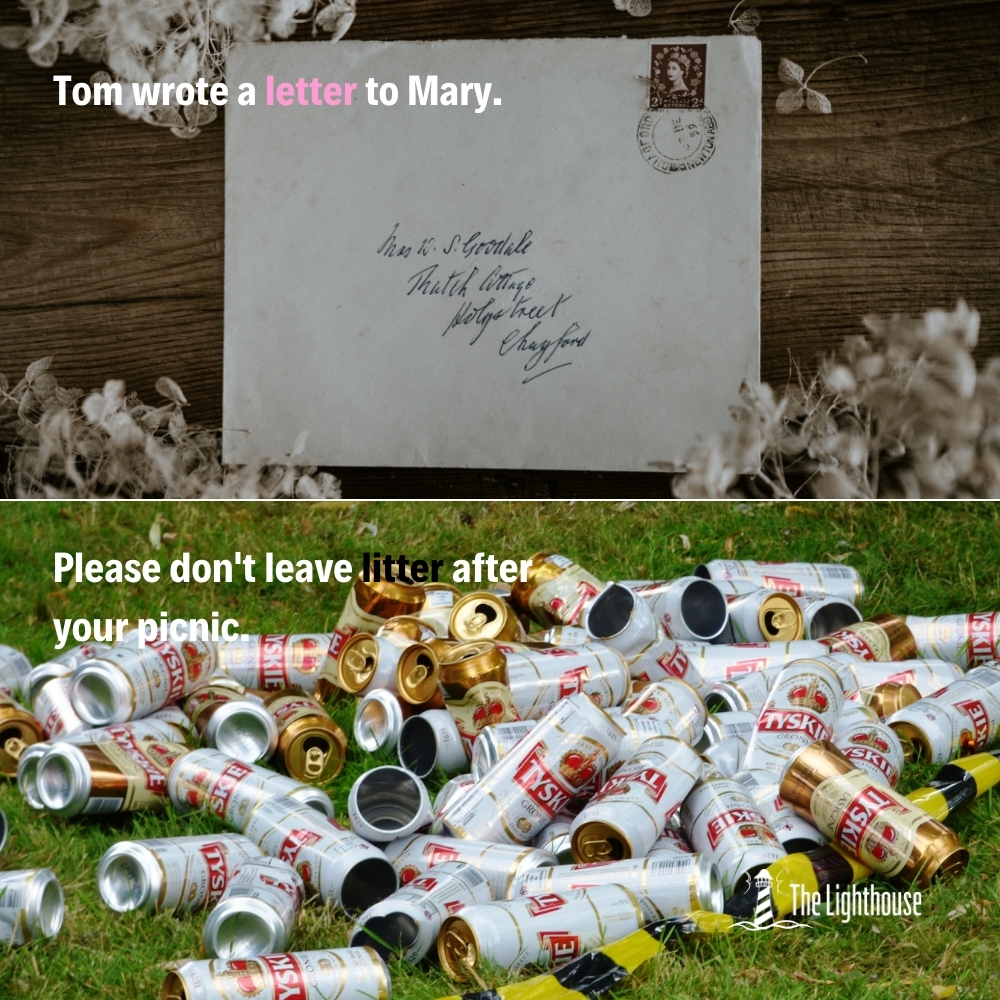Hey there, word wizards! Have you ever found yourself scratching your head over the difference between "liter" and "litter"? Well, you're not alone! These two words might look similar, but trust me, they mean entirely different things. Understanding the distinction is crucial if you want to level up your English game and avoid embarrassing slip-ups in your writing. So, let's dive into the world of "liter" and "litter" and uncover their secrets!
When it comes to mastering the English language, knowing the nuances between similar-sounding words is key. Whether you're a student, a professional writer, or just someone who loves playing with words, getting the right word at the right time can make all the difference. That's why we're breaking down "liter" and "litter" in this article, so you'll never confuse them again.
By the end of this read, you'll have a crystal-clear understanding of what each word means, how they're used in sentences, and some handy tips to keep them straight in your mind. So, grab a cup of coffee, sit back, and let's get started on this linguistic journey!
What Does "Liter" Mean?
Let's kick things off by talking about "liter." Now, this little guy isn't just any word—it's a unit of measurement used globally. A liter is a metric unit of volume, commonly used to measure liquids like water, milk, or even fuel. Think of it as the go-to guy when you're dealing with anything liquidy!
Here's a fun fact: one liter equals about 0.264 gallons. So, if you're ever in Europe and see a bottle labeled "1 liter," you'll know exactly how much liquid you're getting. It's super handy for travelers, cooks, and anyone who loves precise measurements.
Examples of "Liter" in Sentences
Need some context? Here are a few examples to help you understand how "liter" works in everyday life:
- I bought a 2-liter bottle of soda for the party.
- The car's fuel tank can hold up to 50 liters of gasoline.
- She drank half a liter of water during her workout.
See how easy it is to use "liter"? Just remember, it's all about measuring liquids!
What Does "Litter" Mean?
Alright, now let's move on to "litter." Unlike "liter," which is all about measuring, "litter" has a completely different vibe. Litter refers to waste or trash that's been carelessly thrown away, often in public spaces. Think of cigarette butts on the sidewalk, plastic bags in the park, or food wrappers on the beach. Yuck, right?
But wait, there's more! "Litter" can also mean a bunch of things scattered around in a messy way. For example, your room might be littered with clothes if you're not the neatest person on the planet. So, whether it's trash or just a mess, "litter" covers it all.
Examples of "Litter" in Sentences
Let's take a look at how "litter" pops up in sentences:
- Please don't litter in the park—it ruins the environment!
- The floor was littered with papers after the meeting.
- They organized a cleanup event to pick up litter along the riverbank.
As you can see, "litter" is all about messiness and waste. Keep that in mind, and you'll never mix it up with "liter" again!
Key Differences Between "Liter" and "Litter"
Now that we've explored both words, let's break down the key differences to make sure you've got them locked in your brain:
- Definition: "Liter" is a unit of measurement for liquids, while "litter" refers to waste or mess.
- Usage: "Liter" is used in scientific and everyday contexts for measuring volume, whereas "litter" is used to describe trash or disorder.
- Context: "Liter" is often seen in cooking, science, and travel, while "litter" shows up in environmental discussions and cleaning scenarios.
Got it? Good! Let's keep rolling!
Common Mistakes People Make
Even the best of us can stumble when it comes to "liter" and "litter." Here are some common mistakes people make and how to avoid them:
- Spelling Errors: Don't accidentally write "litter" when you mean "liter" (or vice versa). Double-check your spelling before hitting send!
- Context Confusion: Make sure you're using the right word for the situation. For example, you wouldn't say, "The beach was covered in liters," because that would just be weird.
By staying mindful of these pitfalls, you'll be golden every time!
How to Remember the Difference
Let's face it—sometimes it's hard to keep track of all these word pairs. That's why we've got some clever tricks to help you remember the difference between "liter" and "litter":
- Think of "liter" as liquid: Both start with "li," so it's a natural connection.
- Picture "litter" as messy: The double "t" in "litter" reminds you of things being scattered or disorganized.
With these memory hooks, you'll never mix them up again!
Why Does It Matter?
You might be wondering, "Why does it even matter if I mix up 'liter' and 'litter'?" Well, my friend, clarity matters! Using the wrong word can confuse your readers, damage your credibility, or just make you look a little silly. Imagine writing a recipe that says, "Add 2 liters of litter to the soup." Not exactly appetizing, right?
Plus, mastering the difference between these words shows that you're paying attention to detail. And in today's fast-paced world, attention to detail is a skill that sets you apart from the crowd.
Real-Life Consequences
Think about it—business emails, academic papers, and even social media posts rely on clear communication. If you're in a professional setting and accidentally use "litter" instead of "liter," it could cost you a client or a job opportunity. Yikes!
Fun Facts About "Liter" and "Litter"
Who says grammar can't be fun? Here are a few fun facts about "liter" and "litter" to brighten your day:
- The word "liter" comes from the Latin word "litra," which was a unit of weight.
- "Litter" has roots in the Old French word "lit," meaning "bed," because people used to scatter straw on beds back in the day.
Isn't language fascinating?
Practical Tips for Using "Liter" and "Litter" Correctly
Ready to put your newfound knowledge into action? Here are some practical tips to help you use "liter" and "litter" like a pro:
- Read More: The more you read, the more you'll see these words in action. Pay attention to how they're used in books, articles, and even advertisements.
- Practice Writing: Try writing sentences or short paragraphs that include both "liter" and "litter." It'll help solidify their meanings in your mind.
- Ask for Feedback: If you're unsure, ask a friend or colleague to proofread your work. A fresh pair of eyes can catch mistakes you might have missed.
With these tips, you'll be a word wizard in no time!
Final Thoughts
Well, there you have it—the ultimate guide to "liter vs litter." By now, you should feel confident in your ability to use these words correctly and avoid any embarrassing mix-ups. Remember, mastering the English language is all about practice, patience, and a little bit of fun.
So, what are you waiting for? Go out there and start using "liter" and "litter" like a pro! And don't forget to share this article with your friends so they can join in on the word party. Together, we can conquer the world of grammar—one word at a time!
Table of Contents
- What Does "Liter" Mean?
- Examples of "Liter" in Sentences
- What Does "Litter" Mean?
- Examples of "Litter" in Sentences
- Key Differences Between "Liter" and "Litter"
- Common Mistakes People Make
- How to Remember the Difference
- Why Does It Matter?
- Fun Facts About "Liter" and "Litter"
- Practical Tips for Using "Liter" and "Litter" Correctly


